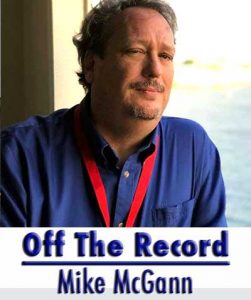By Mike McGann, Editor, The Times
 Somewhere out there is an imaginary digital cow being sued by a sitting member of Congress and he/she/it is fighting to keep our First Amendment rights, well, rights.
Somewhere out there is an imaginary digital cow being sued by a sitting member of Congress and he/she/it is fighting to keep our First Amendment rights, well, rights.
@devincow is one of a number of Twitter accounts that exist to mock U.S. Rep. Devin Nunes (R-Cal.), the former head of the U.S. House Intelligence Committee.
To be sure, few in American politics deserve abject mocking more than Mr. Nunes — who seemed to be actively leaking information to the Trump Administration about the investigation into Russian interference (and cooperation with the Trump Campaign, as later detailed by Robert Mueller).
Because Mr. Nunes has skin thinner than WalMart-brand tissues and an intellect usually reserved for geological specimens, he is suing the digital cow for, wait for it, $250 million, to salve his hurt fees fees.
Put simply, Nunes is a putz — search social media for his various face plant inducing takes to prove my point — and yes, that’s my opinion, as protected in New York Times v. Sullivan — an opinion shared by a whole lot of people, by the way.
So, therefore, it is perfectly valid — and arguably necessary — for people to mock him, as well as various other elected officials, especially those with exceedingly thin skin (not that I’m thinking of any one former local congressman. Nope. Not. At. All.).
It’s not like this sort of anonymous bashing is a new thing in American politics — go back to the 1790s when Alexander Hamilton and Thomas Jefferson hauled out the rather eloquent whoop-ass on each other using nom d’plumes (French for Pen Name). Benjamin Franklin, James Madison, John Jay and many, many other founding fathers used anonymous names to make, at times, rather nasty political and personal points.
Arguably, few things are as American as ripping our political leaders anonymously.
Don’t get me wrong, I love ripping our political leaders with my name up there in bold type — but not everyone has the luxury of being able to do so. Some folks have jobs and work for people who would fire them for making such statements publicly, others have reasons, more personal, to not want to bring attention to their person, just their thoughts, ideas and opinions.
So what does that have to do with Chester County, and The Times?
For many years, some folks wanted to know who commenters were on the site. I politely declined. Some asked that we lock down or end comments, as some publications have done. While I moved to use a more restrictive system for a spell, it seemed wrong, and I opened things back up.
Keep in mind, I still reserve the right to edit/delete comments that are beyond the pale, threatening and the like — which makes The Times a bit different than Twitter or Facebook — we do moderate, albeit with a light touch.
Opinions matter. Your voice matters.
Which is why I’m pulling for an imaginary cow in a Virginia courtroom this week.
We all should be. The judge in the case is demanding to know who the cow is. One would hope Twitter declines politely but firmly to share that information.
News flash for judge: we are all the cow. Those of us who care about free speech, who care about the future of America and yes, the U.S. Constitution.









Back maybe in 2006 the Daily Local News required commenters of articles be identified. Back when DLN reporters could be found at Coatesville City Hall I told a reporter that if you require identification people with real information would put their lives in jeopardy. The DLN was cutting off valuable information that anonymity can bring. Coatesville remains a town where several people can be in a room where there is a murder and know one saw it. Because if they saw it several of their relatives could be hurt.